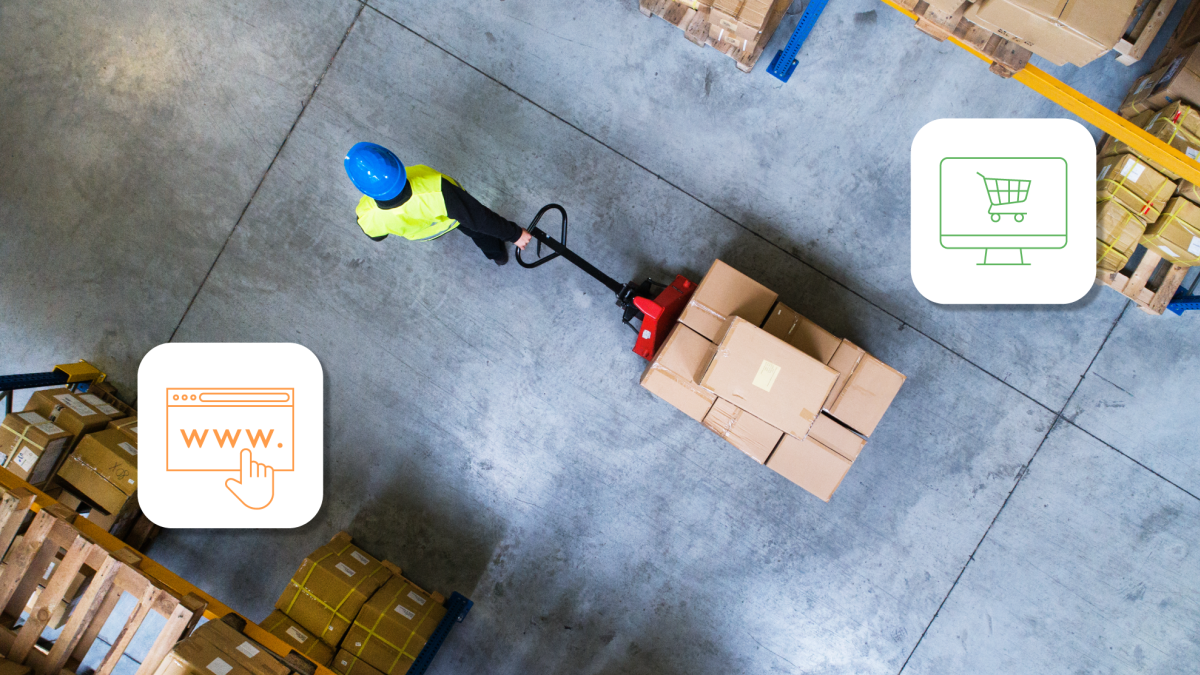It’s been a rollercoaster of a year. And not the kind of ride you’d eagerly wait in line for at Disneyland. More like one that lasts an unknown amount of time and requires you to wear a blindfold so you can’t prepare for the next upside-down loop. Analogies aside, 2020 has hit the retail industry hard. This is especially true for brick-and-mortar stores around the globe. But what about B2B retail businesses and the wholesale ecommerce sector?
In this article, we’ll take a look at modern-day wholesale ecommerce, how it’s changed over the years, what platforms are available, and what the future could look like in the rest of 2020 and beyond.
Modern-day wholesale ecommerce
Wholesale today isn’t like what it used to be a few years, or even months, ago. Now more than ever, the industry relies on digitalization. And digitalized B2B selling is the backbone of wholesale ecommerce.
The impact of digital transformation
Unlike B2C commerce, B2B transactions don’t involve the consumer. Rather, it’s a sale between two businesses. That said, it does lay the foundation for the retail industry. And with the retail industry undergoing a huge digital transformation over the years, B2B sellers have also needed to adapt. Thus, B2B ecommerce was born.
Today’s B2B buyers are more and more often using online selling platforms to research and complete their business purchases. In fact, a survey conducted by Forrester’s Senior Analyst for Digital Business, Bruce Eppinger, discovered that 68% of modern-day buyers preferred buying online over interacting with a sales representative.
Learn more about the modern-day B2B buyer here.
These consumer demands paired with the rise of digitalization in the retail industry make it critical for B2B sellers to adapt. Luckily, there are many online platforms available to help them do just that.
Wholesale ecommerce platforms
Not unlike that of a B2C marketplace like Amazon, wholesale ecommerce platforms facilitate the retail transaction between two parties. The difference is who’s purchasing and selling. Here, B2B sellers can list products in front of business buyers, with wholesale prices and relevant shipping information.
Benefits of using wholesale ecommerce platforms
Suppliers choosing to list offers on digital platforms designed for business to business transactions can expect to see a ton of benefits.
Grow your audience with more online visibility
Modern-day B2B buyers use online sales platforms to conduct research and inform their purchase decisions. By meeting these buyers where they are, your business is increasing the chances of being found and remembered by your customers. Moreover, the more channels you’re on the wider your audience.
Boost sales potential
Wholesale ecommerce platforms allow businesses to provide all relevant information up-front so that buyers can research and shop on their own time and at their convenience. Today’s B2B buyers expect convenience, so using these marketplaces is a great way to cater to consumer needs. In fact, wholesale online sales channels grant them 24-hour access! They can shop whenever they want.
Sales informed of the competition
In traditional wholesale commerce, businesses send tailored catalogs directly to buyers, instead of letting buyers come to them. This happens behind the scenes and catalogs aren’t usually accessible to the general public. Of course, this also makes it difficult to keep track of your competition offers and pricing. Wholesale ecommerce platforms are an open book where you can freely monitor your competition to better optimize your pricing for increased sales.
Popular B2B marketplaces
So now that we’ve discussed a few (of the many) benefits, you’re probably wondering what channels are actually out there and which are worth your time. Let’s look at two major platforms that you might want to consider.
X-Cart
X-Cart is a multi-use commerce platform designed to help suppliers digitalize their businesses. The platform provides vendors with unique tools to help them attract more modern B2B buyers with powerful shopping experiences across channels.
Check out supplier success stories here.
Amazon
Did you know that one of the world’s largest B2C online marketplaces also has a widely-popular B2B marketplace? That’s right, Amazon Business, which functions very similarly to Amazon Marketplace, was created to help connect suppliers with their business buyers. Now it is used by 55 of the Top Fortune 100 wholesalers across nine countries and caters to over one million business buyers worldwide! Check out this video Amazon put together to learn more about selling on Amazon Business.
“We use Amazon Business to complement our existing distribution model and reach a broader range of business customers. We look forward to a more streamlined approach to identifying, approving, and tracking the delivery of the products our teams need both in the office and in our manufacturing plants.”
Lisa Citton-Battel, Director, Consumer Business Group, 3M Canada
Read more supplier success stories and testimonials here.
The future of wholesale ecommerce
It’s no question that wholesale has gone under a huge transformation in recent years. But possibly even more so in the last few months. Let’s look at how the industry is handling 2020, the virus, and what the future of wholesale ecommerce could look like.
2020 and the impact of COVID
Offline wholesale businesses across the globe have taken a huge hit in the first half of 2020. Face-to-face meetings, physical catalog-based transactions, business meetings, and so on have all been disrupted and will likely never be the same as they once were. For businesses relying on the physical aspect of business, this public health crisis has been somewhat of a wake-up call.
Online wholesale businesses, on the other hand, have been dramatically less impacted by societal changes. Less reliant on in-person business endeavors, sales can continue as usual. So what could this mean for the future?
What the future could look like
We’re likely to see more and more wholesale businesses adopt an online sales and marketing strategy. B2B businesses and buyers were already adopting digitalization before this crisis. However, with these disruptions, the adoption has been greatly accelerated.

